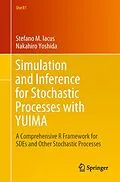The YUIMA package is the first comprehensive R framework based on S4 classes and methods which allows for the simulation of stochastic differential equations driven by Wiener process, Lévy processes or fractional Brownian motion, as well as CARMA processes. The package performs various central statistical analyses such as quasi maximum likelihood estimation, adaptive Bayes estimation, structural change point analysis, hypotheses testing, asynchronous covariance estimation, lead-lag estimation, LASSO model selection, and so on. YUIMA also supports stochastic numerical analysis by fast computation of the expected value of functionals of stochastic processes through automatic asymptotic expansion by means of the Malliavin calculus. All models can be multidimensional, multiparametric or non parametric.The book explains briefly the underlying theory for simulation and inference of several classes of stochastic processes and then presents both simulation experiments and applications to realdata. Although these processes have been originally proposed in physics and more recently in finance, they are becoming popular also in biology due to the fact the time course experimental data are now available. The YUIMA package, already available on CRAN, can be freely downloaded and this companion book will make the user able to start his or her analysis from the first page.
- Contains both theory and code with step-by-step examples and figures
- Uses YUIMA package to implement the latest techniques available in the literature of inference for stochastic processes
- Shows how to create the description of very abstract models in the same way they are described in theoretical papers but with an extremely easy interface
Stefano M. Iacus, PhD, is full professor of statistics the Department of Economics, Management and Quantitative Methods at the University of Milan. He has been a member of the RCore Team (1999-2014) for the development of the R statistical environment and now member of the R Foundation. His research interests include inference for stochastic processes, simulation, computational statistics, causal inference, text mining, and sentiment analysis.
Nakahiro Yoshida, PhD, is a professor at the Graduate School of Mathematical Sciences, University of Tokyo. He is working in theoretical statistics, probability theory, computational statistics, and financial data analysis. He was awarded the Japan Statistical Society Award in 2009 and the Analysis Prize from the Mathematical Society of Japan in 2006.
Autorentext
Stefano M. Iacus, PhD, is full professor of statistics in the Department of Economics, Management and Quantitative Methods at the University of Milan. He has been a member of the R Core Team (1999-2014) for the development of the R statistical environment and is now a member of the R Foundation. His research interests include inference for stochastic processes, simulation, computational statistics, causal inference, text mining, and sentiment analysis.
Nakahiro Yoshida, PhD, is full professor at the Graduate School of Mathematical Sciences, University of Tokyo. He is working in theoretical statistics, probability theory, computational statistics, and financial data analysis. He was awarded the Japan Statistical Society Award in 2009 and the Analysis Prize from the Mathematical Society of Japan in 2006.
Inhalt
Introduction
1.1 Overview of the project
1.2 Who should read this book?
1.3 Structure of the book
1.4 How to get the R code for this book
1.5 Main contribution to the Yuima package
1.6 Further developments of Yuima Package
1.7 Things to know about R
1.7.1 How to get R
1.7.2 R and S4 objects
1.8 The yuima package
1.8.1 How to obtain the package
1.8.2 The main object and classes
1.8.3 The yuima.model class
1.9 On model specification
1.9.1 Basic model specification1.9.2 User-specified state and time variables
1.9.3 Specification of parametric models
1.10 Basic facts on simulation
1.10.1 Customization of simulation arguments
1.10.2 Simulation of models with user-specified notation
1.10.3 Simulation of parametric models
1.11 Sampling and simulate
1.11.1 Sampling and subsampling
1.12 How to make data available into a yuima object
1.12.1 Getting data from data providers
1.13 How to extract data from a yuima object
1.14 Time series classes, time data and time stamps1.14.1 Review of some time series objects in R
1.14.2 How to handle real time stamps
1.14.3 Dates manipulation
1.14.4 Using dates to index time series
1.14.5 Joining two or more time series
1.14.6 Subsetting a time series
1.15 Miscellanea
1.15.1 From Yuima to LATEX
1.15.2 The Yuima GUI
Part II Models and Inference
2 Diffusion processes
2.1 One dimensional model specification
2.1.1 Ornstein-Uhlenbeck (OU)
2.1.2 Geometric Brownian motion (gBm)2.1.3 Vasicek model (VAS)
2.1.4 Constant elasticity of variance (CEV)
2.1.5 Cox-Ingersoll-Ross process (CIR)
2.1.6 Chan-Karolyi-Longstaff-Sanders process (CKLS)
2.1.7 Hyperbolic diffusion processes
2.2 More about simulation
2.3 Space-discretized Euler-Maruyama simulation scheme
2.4 Multidimensional processes
2.4.1 The Heston model
2.5 Parametric inference
2.5.1 Quasi maximum likelihood estimation
2.5.2 Adaptive Bayes estimation
2.6 Example of real data estimation for gBm
2.7 Example of real data estimation for CIR2.8 Hypotheses testing
2.9 AIC Model Selection
2.9.1 An example of AIC model selection for exchange rates data
2.10 LASSO model selection
2.10.1 An example of Lasso model selection for interest rates data
2.11 Change point estimation
2.11.1 Example of volatility change-point estimation for 2-dimensional SDE's
2.11.2 An example of two stage estimation
2.11.3 Example of volatility change-point estimation in real data
2.12 Asynchronous covariance estimation
2.12.1 Other covariance estimators
2.13 Lead-lag estimation2.13.1 Application of the lead-lag estimator to real data
2.14 Asymptotic expansion
2.14.1 Asymptotic expansion for general stochastic processes
3 Compound Poisson processes
3.1 Inhomogenous Compound Poisson Process
3.1.1 Linear intensity function
3.1.2 The Weibull model
3.1.3 The exponentially decaying intensity model
3.1.4 Modulated and periodical intensity model
3.1.5 Frequency modulation model
3.2 Multidimensional Compound Poisson Processes
3.2.1 Multivariate Gaussian Jumps3.2.2 User specified jump distribution
3.3 Estimation
3.3.1 Compound Poisson process with Gaussian jumps
3.3.2 NIG Compound Poisson process
3.3.3 Exponential jump Compound Poisson process
3.3.4 The Weibull Compound Poisson process
